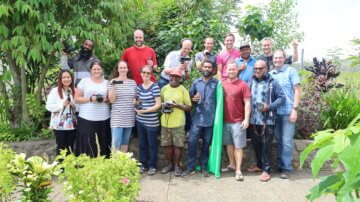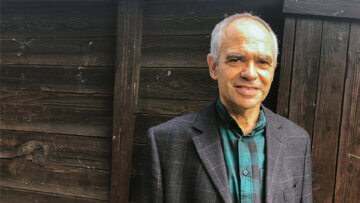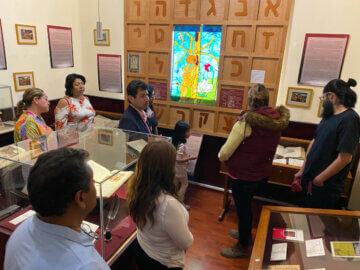New Directions for Bible Translation Training
“Despite the limitations of human culture and language, God still entrusts Bible translation to us. I feel humbler and more fearful of God through this course. God’s mission is enormous, yet he loves and accepts different languages and cultures.”
Ke-yi Kim of Wycliffe Taiwan is reflecting on the highlights of a ground-breaking training programme for Bible translation held recently in Singapore.

The first module of “Language and Translation in the Mission of God” is held in the Discipleship Training Centre in Singapore.
While Bible translation still seems to be largely an academic pursuit for highly professional linguists, the training programme that Ke-yi attended, “Language and Translation in the Mission of God” (LTMG), is a bit different. LTMG focuses on the mission of God, has a more holistic view and targets a wider group of trainees.
The first module of LTMG was jointly organised by the Asia-Pacific Leadership Team of the Wycliffe Global Alliance (the Alliance), and Wycliffe Singapore from 2 to 6 December, 2019. A total of fourteen trainees from Malaysia, Indonesia, Singapore, Taiwan and Thailand attended the training. Participants included young people considering their role in missions, full-time workers from local churches and mission organisations, leaders of Alliance organisations, and those who are working in Bible translation projects.
In response to the Alliance Board’s mandate to develop training materials, and in order to serve Alliance organisations that are managing Bible translation programmes, the Asia-Pacific Leadership Team aims to work with Alliance Organizations to develop contextually appropriate and holistic training curriculums for Bible translation. The Alliance believes that everyone involved in Bible translation work should be trained and equipped to understand how translation fits into the mission of God.
Why another Training?
Since 1942, Wycliffe Bible Translators has been actively involved in Bible translation and language-related ministry, and there are excellent linguistic trainings available. So why another training? How does this one differ from the existing training programs? Who does this course target?
“There are training needs on various levels,” says Simon Wan, Asia-Pacific Area Director.

Dr Harmelink (standing) interacting with trainees during the class.
He continues, “There is a need to provide training for those who are exploring Bible translation as a calling, as well for others who are already involved in a Bible translation programme as mother-tongue translators, facilitators or consultants.”
Dr Bryan Harmelink, the key trainer, is Director for Collaboration on the Alliance Leadership Team. During the past forty years, Dr Harmelink served as a Bible translator in Chile and as a translation consultant throughout Africa, Latin America and other regions. He affirms that Wycliffe and its partner organisations have had a good history of training in linguistic analysis, but adds that the LTMG programme has a different focus.
Understanding the Role of Language in God’s Mission
Instead of linguistic analysis, LTMG has a greater emphasis on understanding of the mission of God, especially in relation to the role of language. For example, how does God use language in his mission? And why is language such a foundational part of his work in the world?

The programme includes many sessions on Scripture study to encourage biblical reflections on language, translation, missions and God’s mission. Photo by Gary McMaster
“[The course is] looking at language from a more theological point of view rather than from the analytical point of view,” explains Dr Harmelink, “Looking at how the mission of God is so fundamental to our work in the Bible translation movement; looking at how we can come together,… work together, listen to each other and serve in the mission of God; looking at theology as a local practice - how it needs to be such a part of the life of the church and the work of translators.”
According to Dr Harmelink, the intended audience is translators and those interested in working alongside translation teams in various ways, and the training draws more on the intuitive ability of native speakers or signers for doing translation.
He hopes the training would help the trainees reflect on languages as an amazing gift from God. As they deepen their understanding of language, it could help them facilitate the process of translation wherever they end up working.
Benefiting Alliance Organisations
“[The programme] covers various important areas which would benefit Alliance organisations.” Simon says.

Through small-group discussions, participants learn from self-reflection and hearing what others share.
He adds that the Alliance does not intend to be “prescriptive” on how the Alliance organisations should use this curriculum that Dr Harmelink is introducing. Simon believes that training should be adapted to local context. For example, while some may apply it as a curriculum for Camp Wycliffe, others may use it to train their facilitators or mother-tongue translators.
Simon also hopes that, in the future, LTMG could be accredited by Bible schools in the region. Nevertheless, there is flexibility for it to be given in different modules to different target audiences in the future.
As a matter of fact, prior to conducting the LTMG module in Singapore, Dr Harmelink successfully ran this LTMG programme with YWAM’s University of the Nations (U of N). A cohort of seven students completed the first Masters in Applied Linguistics for Bible Translation at U of N in early 2019. Dr Harmelink also collaborates with the Seed Company to conduct a similar programme at the Bible Institute of South Africa in Cape Town.
Seeds planted in Trainees’ Hearts
Trained in linguistics, Singaporean Rachael Chong has always been interested in cultural differences among languages. So what has she learnt from the training?
“I've been struck by [the realisation] that language, translation and the mission of God are very closely interconnected. Translation is not simply presenting the gospel in a different language of the target culture, but it's understanding the culture and its cultural sensitivities, and presenting the gospel in the way that people best understand,” shares Rachael.
Through the training, she sees how language directly contributes to translation work and to Christianity, the gospel and her faith. She describes what she has learnt as a seed that was planted, and hopefully it may grow in God’s time.
Malaysian Joanna Niow loved hearing the inspiring stories from the history of Bible translation, and was reminded that translation is influenced by globalisation, social sciences and technology.
Joanna is a mission worker with YWAM and is going to start the first oral Bible translation soon in the region where she serves. She hopes that with this training she will be better equipped with the right questions to ask her team members so that they can produce a better translation together.

Ke-yi Kam of Wycliffe Taiwan (right) listens to input from Simon Wan (left), the Area Director of Wycliffe Global Alliance Asia-Pacific.
Seasoned mission worker Ke-yi Kim returned to Taiwan a few years ago and now serves as a mobiliser for Wycliffe Taiwan. With a passion to help Taiwan young people to become involved in missions, she finds this training helpful in reflecting on multilingualism as a special blessing from God.
She also has learnt to see missions from a higher perspective - what God’s heart and will for the whole world is, and how he uses language and culture through Bible translation to make himself known.
“Now I can use an even more exciting angle and a higher perspective to encourage young people to join Bible translation, and to help them know that Bible translation is not burying their heads in words, but getting involved in his immense global picture,” Ke-yi shares.

Telly Novyanna Dadoalia (left) of Kartidaya Indonesia and David Tan, the Executive Director of Wycliffe Singapore at a sharing night.
Telly Novyanna Dadoalia from Kartidaya Indonesia was one of the few participants who have been working on a translation project already.
“The first thing that impacted what I have been doing as a facilitator is to explore more deeply and to [seek to] appreciate more fully the riches of the languages and cultures of the people we serve,” shares Telly.
“Not only should people come to God, but they also should be encouraged to worship God and to have a deeper relationship with him in their own way, with their expressions, and through the language closest to their hearts.”
Looking Forward
After the five-day training, Dr Harmelink, Simon and a core group conducted a review. They agreed that in order to make this LTMG programme sustainable, training instructors must be a priority. Thus, instructor trainings are planned for August and December in 2020, and April in 2021.
Finally, Simon asks for prayer that through this LTMG programme, many people would understand not just the need for Bible translation but to understand the heart of God in relation to what his purposes are for Bible translation.
Text and photos by Ling Lam unless otherwise noted.
Watch the video: New Directions - Language & Translation in the Mission of God
The latest
View all articles
Informing, teaching, inspiring: PNG workshop teaches video storytelling for language communities
PNG workshop teaches video storytelling for language communities
Read more
Looking ahead at 2024
As the year unfolds, we marvel at the work of God in our rapidly changing world. And, we look forward to a number of gatherings and conversations intended to draw us together.
Read more
Telling the Bible's Story
It may come as a surprise that a museum is among the Wycliffe Global Alliance organisations.
Read more